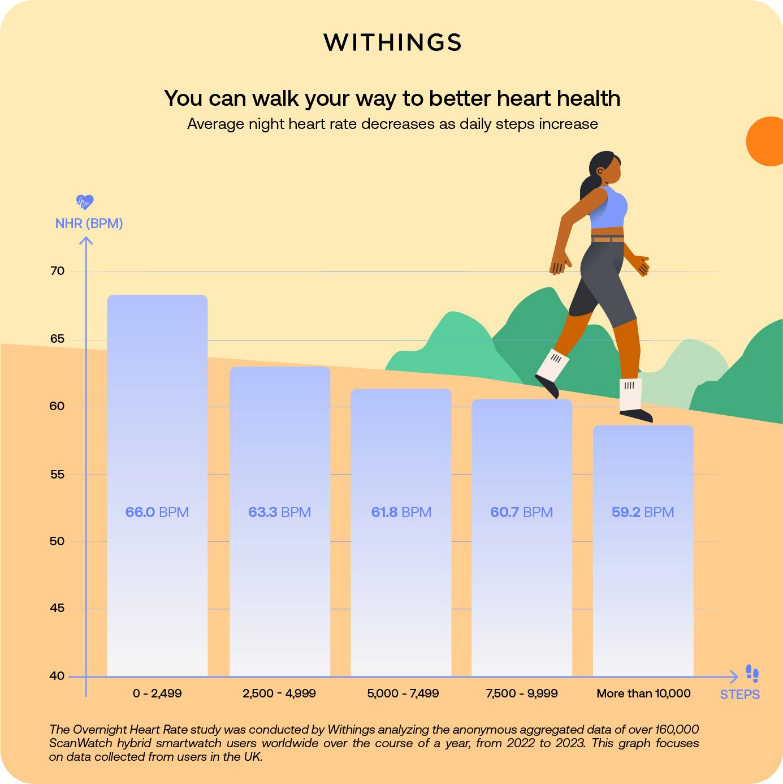
Today marks World Heart Day, according to The World Heart Federation. This day aims to raise awareness about cardiovascular disease. Coronary Heart Disease is responsible for around 66,000 deaths in the U.K. each year, an average of 180 people each day, or one death around every eight minutes. In the U.K., one in eight men and one in 14 women die from coronary heart disease. Withings, the pioneer of the connected health movement, is pleased to release a study that gives an in-depth look at what happens to our heart rate when our heads hit pillows.
In an extensive and insightful research endeavour, Withings, a pioneering figure in the field of connected health technology, embarked on a comprehensive examination of nighttime heart rate (NHR) among a global cohort exceeding 160,000 Withings users. This diverse group, ranging in age from 18 to 70, was tracked meticulously over a year, from 2022 to 2023. The outcome of this investigation is profoundly illuminating: individuals who consistently accumulate more than 10,000 steps in a day exhibit a nocturnal heart rate that averages 4.74 beats per minute lower than those who undertake less than 5,000 steps. This discovery holds immense significance, as it underscores the strong association between a heightened NHR and an elevated risk of cardiovascular disease.
The robustness of these findings is substantiated by the work of Johansen and colleagues, whose research demonstrated that nighttime heart rate serves as a superior predictor of cardiovascular events and overall mortality. Notably, NHR stands out as an informative metric because it gauges heart rate during moments of repose when the body is engaged in recuperation and rejuvenation. Traditionally, resting heart rate has held sway as a vital biomarker in assessing an individual’s cardiovascular well-being. A typical nighttime heart rate registers between 40 and 60 beats per minute, representing a 10 to 15 per cent decrease from one’s resting heart rate. An elevated NHR may indicate various health concerns, including cardiovascular ailments, diabetes, and obesity.

Dr Pierre Escourrou, a distinguished cardiologist and sleep specialist, elucidates the relevance of nighttime heart rate: “Nighttime heart rate serves as an effective gauge of cardiovascular health due to its ability to reflect the activity of the autonomic nervous system, which governs the heartbeat. An elevated nocturnal heart rate can signify compromised cardiovascular function and may be indicative of conditions such as hypertension and kidney impairment. To foster a healthier nighttime heart rate, individuals should cultivate sound sleep hygiene, encompassing practices like abstaining from evening alcohol consumption, unwinding before bedtime, and engaging in daytime physical activity.”
Evidently, regular physical exercise emerges as a potent tool in modulating nighttime heart rate and mitigating the risk of cardiovascular afflictions. The comprehensive study by Withings unequivocally establishes a direct correlation between the number of daily steps and nighttime heart rate; as the daily step count increases, the average nocturnal heart rate experiences a proportional decline. Thus, the empirical data accentuates the transformative potential of walking in positively influencing nighttime heart rate, a salutary effect that is further enhanced by stress reduction and adequate sleep.
The Methodology employed in this study merits special attention: An extensive dataset encompassing 161,239 individuals aged 18 to 70, all of whom sported Withings ScanWatch devices, served as the foundation of this investigation. The study population was bifurcated into two principal cohorts: a predominantly sedentary group, characterized by less than 5,000 daily steps, and an active group, whose members logged over 10,000 steps each day. Geographically, the study canvassed participants from the United States, United Kingdom, Germany, and France, with each region boasting at least 10,000 users. Rigorous statistical methods factored in a range of confounding variables to validate the scientific integrity of the results. These variables encompassed recent Body Mass Index (BMI) measurements, gender, and age brackets, with a particular focus on the age group from 30 to 70 years old.



